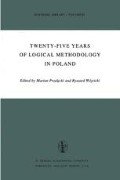Abstract
This paper is an attempt to apply some methods of model theory in order to analyse the concept of empirical meaningfulness (significance), and to investigate some of its properties. In my introductory remarks I shall discuss briefly Carnap’s last definition of empirical significance [3]. I have to explain why I am reopening a problem which is widely considered as satisfactorily solved (cf. [1]). Besides I want to recall some notions of methodology of empirical sciences, and some basic ideas connected with the object of the essay. In the concluding parts of the article philosophical comments will be rather short.
First published in Studia Logica XIX (1966).
Access this chapter
Tax calculation will be finalised at checkout
Purchases are for personal use only
Preview
Unable to display preview. Download preview PDF.
Bibliography
Y. Bar-Hillel, ‘Rudolf Carnap, The Methodological Character of Theoretical Concepts’ (review), Journal of Sambolic Logic 25 (1960).
R. Carnap, ‘Testability and Meaning’, Philosophy of Science 3 and 4 (1936-1937).
R. Carnap, ‘The Methodological Character of Theoretical Concepts’, Minnesota Studies in the Philosophy of Science 1 (1956).
W. Craig, ‘Three Uses of the Herbrand-Gentzen Theorem in Relating ModelTheory and Proof-Theory’, Journal of Symbolic Logic 22 (1957).
H. Feigl, ‘Some Major Issues and Developments in the Philosophy of Science of Logical Empiricism’, Minnesota Studies in the Philosophy of Science 1 (1956).
C. G. Hempel, ‘Problems and Changes in the Empiricist Criterion of Meaning’, Revue Internationale de Philosophie 4 (1950).
C. G. Hempel, ‘The Theoretician’s Dilemma-A study in the Logic of Theory Construction’, Minnesota Studies in the Philosophy of Science 2 (1958).
D. Kaplan, ‘Significance and Analyticity-A Comment of Some Recent Proposals of Carnap’, manuscript.
D. Kaplan, On Significance, manuscript.
J. Kemeny, ‘A new Approach to Semantics’, Journal of Symbolic Logic 21 (1956).
M. Kokoszynska, ‘0 dwojakim rozumieniu uzasadniania dedukcyjnego’ (‘On Two Ways of Interpreting Deductive Justification’), Studia Logica xm (1962).
T. Kubinski, ‘Nazwy nieostre’ (‘Vague Names’), Studia Logica vm (1958).
P. Marhenke, ‘The Criterion of Significance’, Proceedings and Addresses of the American Philosophical Association 23 (1950).
M. Przelecki, ‘w sprawie termin6w nieostrych’ (‘On vague terms’), Studia Logica xm (1958).
W. O. Quine, Mathematical Logic, Harvard 1955.
R. Suszko, ‘Syntactic Structure and Semantical Reference’, Studia Logica VII, IX (1958).
R. Suszko, Wyklady z logiki formalnej (Lectures on Formal Logic), WarSZ8wa 1965.
R, Wojcicki, ‘Sensownosc termin6w teoretycznych-Krytyczne uwagi Q:pewnej koncepcji R. Carnapa’ (‘Meaningfulness of Theoretical terms-Some Critical Remarks on a Certain Carnap’s Conception’), Ruck Filozo/iczny XXII (1964).
R. Wojcicki, ‘0 warunkach empirycznej sensownosci terminow’, in:’ TefJria a doswiadczenie (‘On the Conditions of Empirical Meaningfulness of Terms’, in: Theory and Experience, Warszawa 1965.
R. W6jcicki, ‘The Relative Meaningfulness of Theoretical Terms’, Studia Logica XIX.
References
There are no essential differences between the criticism of Carnap’s definition presented here and the critical remarks on this definition I had had oportunity to present on one of meetings of Wroclaw Division of Polish Philosophical Society (Wrocławski Oddział Polskiego Towarzystwa Filozoficznego) in 1962 (see [18]).
learned only much later that the same objection against Carnap’s conception had been raised earlier by David Kaplan in his two non-published papers [8], [9].
Perhaps it is worthwhile to mention that Carnap’s definition implies some other difficulties I did not discuss here. For example, an interesting criticism of Carnap’s proposal has been given by Hempel [7].
For more detailed remarks on this matter see [20].
The notion of a possible model of L introduced here corresponds to the notion of a model for a vocabulary of L defined in [16].
Obviously this pessimistic point of view is far not unanimously accepted. One can find an interesting reply to the doubts of Hempel in an essay writen by Feigl [5].
Assume that the set of the postulates of is symmetric with respect to Ti and Tj, i.e. if Ti and Tj are interchanged everywhere the set as whole remains unchanged, Ti and Tj characterized by such a set of postulates are O-indistinguishable (see [19], Theorem 2). Nevertheless our assumption does not exclude that the set of postulates entails the formula: (1) ~⋀x1…⋀xk(Ti(x1,…,xk)=Tj(x1,…,xk)) Ti, Ti being k-place predicates. Because of (1), even if T can serve as a interpretation both of Ti and of Tj, and Tj cannot be interpreted as T at the same time. This makes clear, why O-indistinguishability does not imply the identity of meaning of the pertinent terms.
The explanations of a and b given in parentheses are informative only. As to ‘the corners’ ‘⌜’ and ‘⌝’ used here, see [15].
The notion of a logical object was introduced by A. Tarski in a lecture given in Polish Academy of Sciences, Warsaw 1959. It corresponds to the notion of an absolute invariant, see [17].
Editor information
Rights and permissions
Copyright information
© 1977 PWN - Polish Scientific Publishers - Warszawa
About this chapter
Cite this chapter
Wójcicki, R. (1977). Semantical Criteria of Empirical Meaningfulness. In: Przełęcki, M., Wójcicki, R. (eds) Twenty-Five Years of Logical Methodology in Poland. Synthese Library, vol 87. Springer, Dordrecht. https://doi.org/10.1007/978-94-010-1126-6_31
Download citation
DOI: https://doi.org/10.1007/978-94-010-1126-6_31
Publisher Name: Springer, Dordrecht
Print ISBN: 978-94-010-1128-0
Online ISBN: 978-94-010-1126-6
eBook Packages: Springer Book Archive

